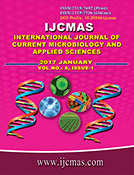


 National Academy of Agricultural Sciences (NAAS)
National Academy of Agricultural Sciences (NAAS)

|
PRINT ISSN : 2319-7692
Online ISSN : 2319-7706 Issues : 12 per year Publisher : Excellent Publishers Email : editorijcmas@gmail.com / submit@ijcmas.com Editor-in-chief: Dr.M.Prakash Index Copernicus ICV 2018: 95.39 NAAS RATING 2020: 5.38 |
Cordyceps is a genus of fungi from the Cordycipitaceae family that grows using host insects as the nutritional source. This genus comprises approximately 500 species worldwide. In the present study, culturing 16 species from 3 genuses of Chu-Soh, namely, Cordyceps, Ophiocordyceps, and Isaria, were successfully artificially cultured We then specifically investigated the antitumor effects of Ophiocordyceps pulvinata on human cancer cells. Secondary metabolites of O. pulvinata (OP-FD) showed a significant anti-proliferative effect on breast cancer and leukemia cells at low concentrations but not on gastric and pancreatic cancer cells at the same concentrations. Virtually no effect was observed in normal human dermal fibroblasts (NHDF) cells. As OP-FD did not lose antitumor activity on heating, further fractionation with organic solvents was conducted to investigate the antitumor effects. The hexane (OP-He) and chloroform (OP-CH) fractions showed a potent cytotoxic effect on human breast cancer and leukemia cells at lower concentrations than OP-FD. Furthermore, OP-He-induced cell death was characterized by mitochondrial impairment, loss of mitochondrial membrane potential (ΔΨm), caspase-9 and-3 activation, sub-G1 phase DNA, chromatin condensation, and DNA fragmentation. These results indicate that the cytotoxicity of O. pulvinata to leukemia cells is due to apoptosis via the caspase-dependent mitochondrial pathway.
 |
 |
 |
 |
 |